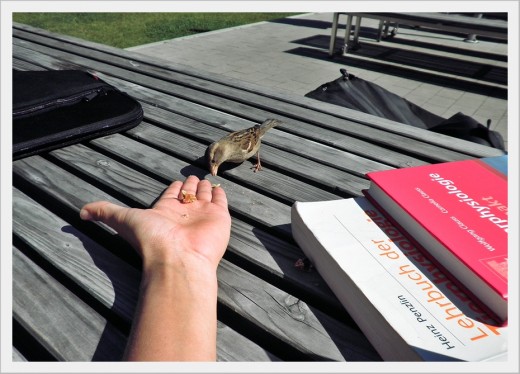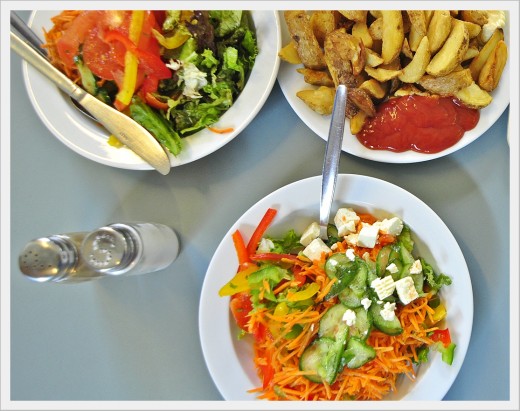How to study with less stress and better results - Part 2

Know yourself and keep yourself motivated
Are you studying in university or school and are constantly under pressure to mug huge quantities of content in no time and then reproduce these in exams? Are you struggling with writing such exams in a vast variety of subjects in a very short span of time, hardly being able to prep yourself only half as good as you would like? And last but not least, do you have difficulty passing your exams or are regularly disappointed with the results you get?
This is the second part of an article that I have written for students who feel like I have described above and want to improve their performance in exams. You can also go back to the first part: Get organized from day 1 or jump towards the third part: Exam time – better grades and less work!
Studying Strategies Part 2
KNOW YOURSELF AND KEEP YOURSELF MOTIVATED
4. Which learning type are you? (or: Do it how you like doing it!)
We all know that some people learn better when they read and write things, others prefer to listen to their material and again others swear on mind-maps or associative learning techniques. To go into detail of each of these possibilities would be too much for this article, but you can find a lot of further information on the net. The main point is to observe yourself – most likely you naturally tend to go towards what is easiest for you. For me certainly reading and hand-writing (much more effective than typing) works with a twist of visualisation. On top of that I find it very helpful to break content into smaller bits – e.g. learning cards in which I use a bit of colour or draw a box around something or add numbering. Very often that is the first thing I remember when the learning-by-heart phase begins “damn, I don’t remember, all I know is that there are seven points and two extra important facts in a red box on the bottom of my card”. Of course remembering a structure like that greatly helps to also remember the full content at some point. On the down-side I discovered that learning cards like this take an incredible amount of time to make and are only a viable option if you bring your lecture’s content throughout the semester in such format. If you get straight into the exam preparation phase it is mostly too late and a waste of your time as for short preparation times other learning strategies might be more useful. If you know from the start that you learn much better through listening the best options for you are the lectures itself and a study group – to which I will come later.
5. Study in the library! (or: How to trick yourself)
For the longest time I refused to believe that it would make a big difference for me, but there are only very few exceptional human beings that can resist the temptations of a fridge, a bed, a TV, a telephone and the internet for long consecutive hours. On top of that many of us magically get drawn into ‘first cleaning up the whole house’ to make it possible ‘to focus’. All this comes under the term of procrastination and the best to avoid it is to work on an empty desk in the library without an internet connection. Additionally you take yourself more seriously when you set yourself proper ‘working hours’ aside and keep your home for what it should be – a place of recreation.
6. Form a study group (or: Bildet Banden!)
It is very helpful to have a fixed study group with whom you can meet on campus throughout the semester to discuss questions you will inevitably get while studying. Especially during the exam prep time a study group or partner can be of excellent help and especially people who learn better through audio information should get together for long question-answer sessions with each other. Additionally having a study group will help you stay motivated when your batteries are getting low – it really is a good break to listen to others discussing the same topic, getting things explained in different words or enjoying being able to explain something to someone else and thus really understanding it yourself. Only make sure that you people don’t start distracting each other and thus keep your coffee breaks short!
7. How fast are you? (or: Rome wasn’t built in a day)
If you constantly get into trouble with your time management or your schedule is just so tight that you really need to push yourself then scheduling yourself is a good way of staying organized. Get yourself a big calendar and put all the important dates into it. Check out how much material you usually get during a lecture for a certain subject and time how much time it takes you to bring this material in its ready to mug form for one lecture. Now interpolate this time with the number of lectures that will come up during the semester and you know how much time you’ll need to invest for the pre-mugging state. For the pure learning-by-heart time I would usually set a full week aside, that of course greatly depends on the nature of your exam – nobody will be able to memorize the full human anatomy in a week, while a mathematics exam might hardly require any learning-by-heart at all. Of course you need to do this for every subject and also mark in your calendar when you will be busy with internships, seminars, presentations, side-jobs or extracurricular activities. Assess which days are good to go to the library. If the library is close to your university, preferably combine a lecture/seminar with library time to save the travelling time. Additionally assess your productive working hours. Some people might be good at focusing 8 hours in a row, but if you are only focused for 4 hours no matter what you try, then spending any more time than this will be contra productive for you. In such cases make sure you go more often, but for shorter intervals. Of course the time of the day is also an important factor. Try studying at different hours of the day/night and you will easily figure out when you are most concentrated. Keep that most effective time for self-study and avoid chatty study groups or mediocre lectures during it – these things are good to keep you going when you have already exhausted your main concentration power. Sometimes when you make yourself such a schedule you will see that latest 3 or 4 weeks into the semester you have to start organizing yourself tightly to set enough preparation time aside for every exam. That easily explains how things get very messy if you on the flip-side only start getting organized 4 weeks before the first exam. Accept your own limitations and work with them!

8. Take a fair amount of breaks (or: Sometimes less is more!)
Sometimes it can be very crucial to take a break. Even if that will mean that you might get behind your own schedule at first, taking a break at the right time might save you loads of time later. Sometimes your energy level will just be too low to focus and you will feel like sitting under a glas cover, not really understanding most of what you study, losing track while reading material again and again, thoughts and gaze wandering out of the window. Nothing is worse than sitting in a stuffy library room on a first summery day of the year. You are young and this is your life – now! Pack your bag and just take a day off, enjoy yourself guilt free and come back the next day with fully recharged batteries. I have seen many a student forcing themselves beyond any good sense, mostly resulting in very low concentrations spans, less motivation and finally bad results. I have often taken breaks at the worst of times (a few days before the exam), listening to my gut feeling of really needing this and it has always helped me to come back to my studies with a fresher clearer mind. Of course you have to keep a balance and avoid getting sucked back into the dark force of procrastination – my rule of thumb is: If you feel good while you are doing something it most likely is good for you – such as cycling in the park on that first summery day, meeting a friend in an ice-cream parlour, and planting stuff on your balcony. If you on the other hand have difficulties getting up, keep cleaning unnecessary things, hang in front of mind-numbing TV programs and everything seems dull then most likely you are procrastinating and thus not being able to enjoy yourself. Just get your bag and go to the library. You will most likely feel better.

9. Experiment with locations (or: More fun and better results)
Just having said the opposite there is another great way of enhancing your motivation and mental happiness during intense studies. Once you have mastered the library as a good environment for concentrated studies you can venture out and try different locations. But opposing to number 8. in which you take a break from all study related thoughts here you are supposed to experiment on your ability to concentrate on your studies in different settings. Over the time I have found out that some days I can study extremely well on a blanket in a park or a sunny balcony. Sometimes I visited my mother for a few days and studied in her living room. Other friends of mine work extremely effective in coffee shops and I was amazed when I realized how well I can memorize my learning cards in the subway. Once I even finished writing half a chapter of a thesis on an outdoor music festival! Of course not everything works for everybody and I am not suggesting that you replace your concentrated library studies with leisure time in the park. But if you start learning to listen to yourself you can try other locations when you feel you have been stuck for too much time in the library. This way you avoid needing a full break day and thus get your work done and feel refreshed in the evening to return to the library the next day!

10. Keep yourself fit (or: Don’t give up yourself)
A healthy mind needs a healthy body to support it! Under extreme time pressure usually the first things we tend to skip is time for exercise, healthy food and a good night’s sleep. Many of my study mates turned over the time of our course into pale, bloated, sleep-deprived nervous wrecks. There were days when I would have 5 times a week pasta with ketchup as my wholesome dinner. If you have scheduled your workload early it will be possible for you to avoid diving into that extreme stress zone and always keep a minimum of a balanced life-style. Overall it is beneficial to eat less, especially before a session of deep concentration as it was found that certain hormones associated with hunger increase your concentration. Keeping time aside for exercise can do wonders when it comes to bringing your stress levels down and of course prevents you from gaining lots of uncomfortable weight due to the increased desk working hours. Sleep is a double-edged sword – overall getting used to a rhythm of less sleep can increase your performance and alertness, but the sleep you get should be quality sleep! Many students get problems to fall asleep easily in the night, but then keep feeling sleepy and thus unproductive throughout the day. Of course sleep-therapy is a complex topic, but just try to begin with to stick to your exercises or other relaxation methods such as Yoga or meditation, fuel your body (at least most of the time) with healthy balanced food, avoid long oversleeping sessions and keep taking breaks when your mind demands it.
Continue this article on my other HubPages:
Exam time – better grades and less work!
Or go back to the first part: Get organized from day 1








